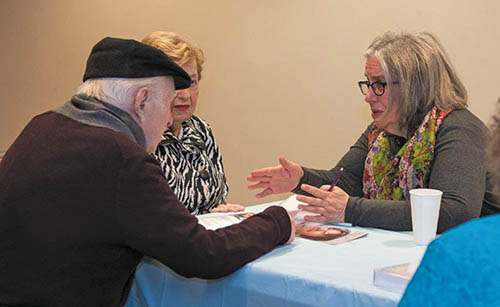

Cafe Europa is a worldwide program sponsored by The Conference on Jewish Material Claims against Germany, which provides monthly gatherings for Holocaust survivors to help them build supportive relationships and participate in social and educational activities including trips, holiday celebrations and entertainment. Our local branch of Cafe Europa is sponsored by the Jewish Family Service of Bergen and North Hudson in collaboration with the Claims Conference. At their recent gathering last week, hosted by Congregation Beth Shalom, Shari Brodsky, project coordinator for JFS, arranged for Debra Kram, Claims Conference Client Outreach Manager, to address local Holocaust survivors about the most recent funds available to them. She was accompanied by Hillary Godin Kessler, Teaneck resident and director of communications for the Claims Conference.
Ms. Kram introduced the program on a personal note, dedicating the meeting to the memory of her beloved father-in-law Leo Kram, whose Yahrzeit is on the seventh of Nissan. A graduate of the University of Riga, he survived numerous labor camps as well as the notorious Buchenwald concentration camp. His liberation from Bergen Belsen took place on Pesach. In his post -liberation diary he writes that the choice at the end was “mes,” to die, or “nes,” a miracle. Fortunately, he was blessed with the latter and his diary is read each year at the family Seder.
Ms. Kram comes to her position at the Claims Conference from a varied background including education and Jewish communal service in the Boston area. Her current position as client outreach manager requires extensive travel throughout the world. She has often been referred to as “the wandering Jew.” But the satisfaction that she garners from guiding Holocaust survivors to resources that make their later years dignified and meaningful make it all worthwhile.
Kram’s purpose in addressing the gathering was to ensure that those in attendance were benefitting from all the resources available to them through the Claims Conference’s extensive list of funds that they have been able to negotiate with Germany and other European countries to compensate victims of the Shoah. From the time of their first agreement with West Germany in 1952, more than $70 billion has been paid to more than 800,000 Holocaust victims. According to the conference, “We negotiate knowing that no amount of money will give them back their youth, their health or those family members who were so cruelly murdered by the Nazis. However, our negotiations result in acknowledgement of their suffering for hundreds of thousands of survivors, many of whom rely financially on these payments.”
In delineating the available funds, Ms. Kram began with the Hardship Fund, open to victims who suffered deprivation of liberty, fled from the Nazi regime, suffered restriction of liberty as defined by the German government and were restricted in movement such as curfew or compulsory registration with limitation of residence. This fund has the widest parameters and encompasses most of the survivors. It is a one-time payment and has no income limit.
By Pearl Markovitz










